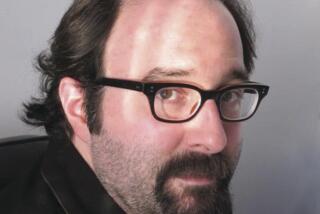Classic Hollywood: Disco era flared, then fizzled
- Share via
Disco music and movies are warmly embraced these days as part of pop culture nostalgia. The era, which began in the mid-’70s, encouraged a whole generation to dance and party — often to excess. And don’t even mention the outrageous clothes. It was an era that ended abruptly; a year after the final disco-themed movies were released in 1980, the AIDS epidemic began and the fun was over.
Most of the disco movies are considered campy cult faves, but 1977’s “Saturday Night Fever” is a bona fide classic. John Travolta, who was a regular on the ABC sitcom “Welcome Back, Kotter,” earned his first Oscar nomination for his unforgettable turn as Tony Manero, a young man toiling in a Brooklyn paint shop who is the king of the local disco. Wearing a white suit and adorned with gold chains, Travolta took charge of the disco dance hall. His character’s introduction strutting down the street to the Bee Gees’ “Stayin’ Alive” is an indelible cinematic image.
Other noted performers made their marks in disco-related movies, including Debra Winger and Jeff Goldblum in 1978’s “Thank God It’s Friday,” which also featured “Disco Diva” Donna Summer. And some of the legends of Hollywood even appeared in these films, such as Gene Kelly in 1980’s “Xanadu” with Olivia Newton-John.
Starting Friday, UCLA Film & Television Archive is dusting off its blue polyester leisure suit and boogie shoes to showcase some of the favorites of the genre with its “Reflections in a Mirrored Ball” series at the Billy Wilder Theater. And if these films give you disco fever, UCLA probably won’t care if you start dancing in the aisles.
“It’s a fascinating collection of films,” said Shannon Kelley, the archive’s head of programming. “There was never a disco genre as such.… Disco was a phenomenon in which movies took some part.”
The age of platform shoes and mirror balls was also an extremely tumultuous one. “The Vietnam War was over, Nixon was out, and that was a trauma,” said Kelley. “A lot of different things came forward to fill that space. Disco was only one of them, but it roared through, and you couldn’t ignore it.”
The festival opens with the 1976 musical-comedy “Car Wash,” directed by Michael Schultz and penned by Joel Schumacher. Though the film is set in an L.A. car wash, it revolves around one of the workers trying to score free tickets to a disco event. The car-wash workers dance to the disco tunes coming over the radio, including the hit “Car Wash,” performed by Rose Royce.
The ensemble cast features Franklyn Ajaye, Ivan Dixon, Garrett Morris, Richard Pryor, George Carlin, Antonio Fargas and Melanie Myron.
After directing the 1975 hit “Cooley High” for American International Pictures, Schultz was given “Car Wash” by Universal. “The producers who brought the idea to Universal were really trying to get the studio to put up money to produce a Broadway musical called ‘Car Wash,”’ recalled Schultz, scheduled to appear at the screening. But Universal head Ned Tanen realized its potential was as a movie.
“When they told me the story, I said we will make the movie a musical and we won’t tell people,” said Schultz. “The producers were smart enough to have hired before me Norman Whitfield to write the music. Norman was a brilliant composer who [co]wrote Motown hits like “Papa Was a Rolling Stone.”
By the time Allan Carr’s (“Grease”) production of the Village People musical “Can’t Stop the Music,” which also starred Bruce Jenner and Steve Guttenberg, was released in summer 1980, disco was on its way out; the movie was D.O.A.
“If the film had come out the summer that we actually shot it, I thought it would have been hugely successful,” said Neil Machlis, who was an associate producer on the film. Machlis will appear at the screening July 18.
“I don’t think anybody thought disco would end as quickly as it did,” said Machlis. “Disco was almost a lifestyle in those days. There were clubs. It was a huge scene. It was a really fun time. But it ran its course. Fads are funny.”
More to Read
The biggest entertainment stories
Get our big stories about Hollywood, film, television, music, arts, culture and more right in your inbox as soon as they publish.
You may occasionally receive promotional content from the Los Angeles Times.











